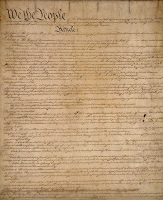 Article I Section 8 Clauses 1-4
Article I Section 8 Clauses 1-4
Section 8 of our constitution lays out in great detail the powers of the Congress. These powers are limited to the ones listed, and those that are “necessary and proper” to carry them out. The states are in charge of everything else. (The Tenth amendment lays this point out in more detail)
Over time the Congress has slowly crept into the realm of what used to be considered “state matters” they most often do this by sighting clause three often called the “commerce clause.” They do this because so much of today’s business crosses state lines. In recent years however the supreme court has been in favor of states rights, limiting what Congress can do by sighting the commerce clause.
[1]The Congress shall have power to lay and collect taxes, duties, imposts and excises, to pay the debts and provide for the common defense and general welfare of the United States; but all duties, imposts and excises shall be uniform throughout the United States;
[2]To borrow money on the credit of the United States;
[3]To regulate commerce with foreign nations, and among the several states, and with the Indian tribes;
[4]To establish a uniform rule of naturalization, and uniform laws on the subject of bankruptcies throughout the United States;
By far the most important (and some would say most poorly used) power laid out in this section is the ability to set taxes, tariffs (imposts), and other means of raising federal revenue. Known as the “power of the purse” this gives the congress its greatest trump card against the executive branch (which must ask congress for all of its funding).
The federal government can borrow money by issuing bonds. This creates the national deb. While at the same time this section gives congress the job of determining how people file for bankruptcy and become citizens. The reason why this is interesting is because even though these two are not related thematically, the fact that they are handled by the Congress means that they apply the same to every state.
An interesting side note. Whiskey was the first thing that Congress ever taxed. In 1791, Alexander Hamilton (Secretary of the Treasury at the time and the guy on the ten dollar bill) proposed this tax as a way of helping pay for the states Revolutionary War debt.
Well this did not go over well and because the tax hurt the farmers the most, they soon rose up. In western Pennsylvania they tarred and feathered the federal agents who tried to collect the tax and set fire to one tax collectors home. George Washington had to call up 13, 000 militiamen from Virginia, Maryland, Pennsylvania, and New Jersey to put down the “whiskey rebellion.” The rebels were quickly rounded up and arrested, proving once and for all that if you don’t pay your taxes Uncle Sam is going to come take them from you.